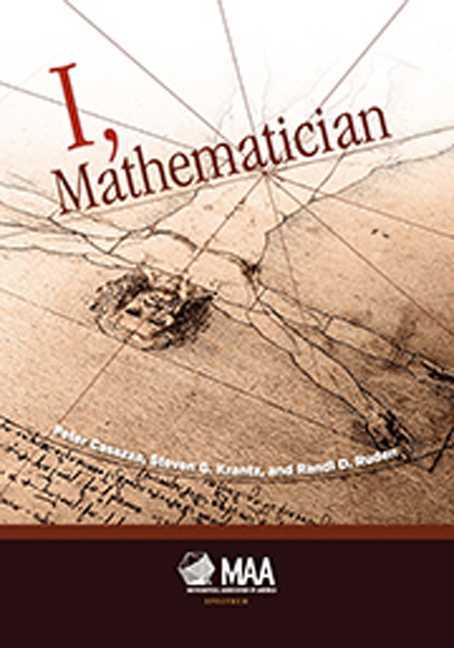Book contents
- Frontmatter
- Contents
- Preface
- Part 1 Who Are Mathematicians?
- Part II On Becoming a Mathematician
- Foreword to On Becoming a Mathematician
- 11 Mathematics and Teaching
- 12 Who We Are and How We Got That Way?
- 13 Social Class and Mathematical Values in the USA
- 14 The Badly Taught High School Calculus Lesson and the Mathematical Journey It Led Me To
- 15 The Psychology of Being a Mathematician
- 16 Dynamics of Mathematical Groups
- 17 Mathematics, Art, Civilization
- 18 Questions about Mathematics
- 19 A Woman Mathematician's Journey
- Part III Why I Became a Mathematician
Foreword to On Becoming a Mathematician
from Part II - On Becoming a Mathematician
- Frontmatter
- Contents
- Preface
- Part 1 Who Are Mathematicians?
- Part II On Becoming a Mathematician
- Foreword to On Becoming a Mathematician
- 11 Mathematics and Teaching
- 12 Who We Are and How We Got That Way?
- 13 Social Class and Mathematical Values in the USA
- 14 The Badly Taught High School Calculus Lesson and the Mathematical Journey It Led Me To
- 15 The Psychology of Being a Mathematician
- 16 Dynamics of Mathematical Groups
- 17 Mathematics, Art, Civilization
- 18 Questions about Mathematics
- 19 A Woman Mathematician's Journey
- Part III Why I Became a Mathematician
Summary
If one wants to become a mathematician, then one is faced with the prospect of a goodly number of years of schooling. Usually this culminates with a Masters Degree or a Ph.D. It is just a fact of life that most of that schooling concentrates on the learning of mathematics and, in the case of the Ph.D., on the discovery of new mathematics. Perhaps an insufficient amount of this time and effort is devoted to ideas about teaching.
It stands to reason, then, that a mathematician writing about “On Becoming a Mathematician” will rely on his/her own personal experience in graduate school, and as an Assistant Professor, to describe what this maturation process consists of. And a key feature of that genesis will be research. When we think about the path that we followed to become a mathematician, we think about papers that we struggled to write, journals that we worked with to get our work published, grants that we applied for, conference invitations that we hoped to receive, and promotions that we sought. Of course teaching was also a big part of our lives, and we worked hard to become excellent teachers. We would be disingenuous to suggest that teaching is not of utmost significance. And we are proud of our teaching. But, when someone asks me what is involved in becoming a mathematician, it is themathematics that looms large.
The essays in this part of the book reflect the philosophy described in the preceding two paragraphs. They certainly talk about teaching and communicating, and well they should. But the emphasis is on the subject matter itself. The reader should balance these pieces against those appearing in the “Who are Mathematicians?” part of the book in order to get a complete picture of what this work is about, and what message it is endeavoring to convey. Everyone who wrote for this volume loves mathematics, and wants to share that enthusiasm and passion.
- Type
- Chapter
- Information
- I, Mathematician , pp. 127 - 128Publisher: Mathematical Association of AmericaPrint publication year: 2015



